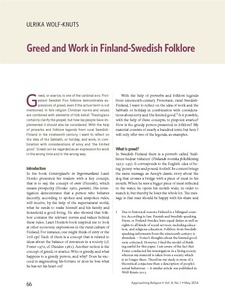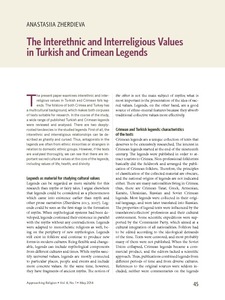Selaus nimekkeen mukaan kokoelmassa
Viitteet 3-13 / 13
-
Functions of Narrative Genres for Lived Religion
(The Donner Institute, Åbo Akademi, 2014)The article presents the object and results of a study which combines the psychology of religion and folkloristics in the form of a qualitative analysis of empirical ethnographic material compiled from sources in a local ... -
Greed and Work in Finland-Swedish Folklore
(The Donner Institute, Åbo Akademi, 2014)Greed, or avarice, is one of the cardinal sins. Protestant Swedish Finn folklore demonstrates expressions of greed, even if the actual term is not mentioned. In folk religion Christian norms and values are combined with ... -
In Search of a National Epic: The use of Old Norse myths in Tolkien's vision of Middle-earth
(The Donner Institute, Åbo Akademi, 2014)In this article some aspects of Tolkien’s work with regard to his relationship to folklore and nationalism are presented. It is also argued, contrary to Lauri Honko’s view of literary epics, that pre-literary sources ... -
Innovations in Epic Studies by Lauri Honko
(The Donner Institute, Åbo Akademi, 2014)This article aims at tracing the roots of the theoretical concepts developed by Lauri Honko in his research on epic: what were his main sources in theoretical thinking, how did he apply and develop concepts formulated by ... -
On Collecting and Publishing the Albanian Oral Epic
(The Donner Institute, Åbo Akademi, 2014)The aim of this paper is to examine how the Albanian epic known as the ‘Cycle of the Frontier Warriors’ has been presented in Albanian folklore collections. I will examine seven written versions of the song ‘The Wedding ... -
Textualising an Oral Epic – Mission Completed
(The Donner Institute, Åbo Akademi, 2014)In this article the author briefly examines three cases that represent Lauri Honko’s views on the textualisation of oral epics. Furthermore, these examples offer an insight into the concept of the paradigm, which was a key ... -
The Interethnic and Interreligious Values in Turkish and Crimean Legends
(The Donner Institute, Åbo Akademi, 2014)The present paper examines interethnic and interreligious values in Turkish and Crimean folk legends. The folklore of both Crimea and Turkey has a multicultural background, which makes both corpuses of texts suitable for ... -
The Missing Books of Magic from Sandvik: In search for hidden books and secret knowledge
(The Donner Institute, Åbo Akademi, 2014)This article aims at defining a privately-owned manuscript from the end of the eighteenth century; a notebook of charms, recipes and ritual prescriptions, presumed to be connected with known manuscripts of magic, that were ... -
The Role of Theory in Folkloristics and Comparative Religion
(The Donner Institute, Åbo Akademi, 2014)Lauri Honko (1932–2002), the Finnish professor of folkloristics and comparative religion was a prolific and multi-talented researcher, whose topics of research ranged from the study of folk beliefs, folk medicine and Ingrian ... -
Vernacular Beliefs and Official Traditional Religion: The position and meaning of Mari worldview in the current context
(The Donner Institute, Åbo Akademi, 2014)Vernacular religion connected with the clan was expected to adapt in the context of globalisation and the vanishing ideals of traditional (tribal) societies. But at the turn of the twentieth and twenty-first centuries a ... -
Vernacular Religion, Contemporary Spirituality and Emergent Identities: Lessons from Lauri Honko
(The Donner Institute, Åbo Akademi, 2014)This article examines lessons which can still be learned from Professor Lauri Honko’s research and writings, particularly for those working at the interstices of folklore and religious studies who appreciate the mutually ...










